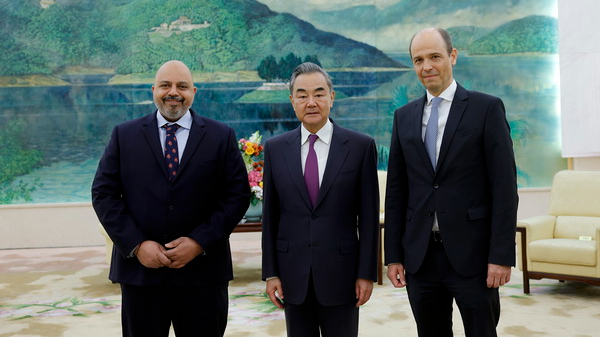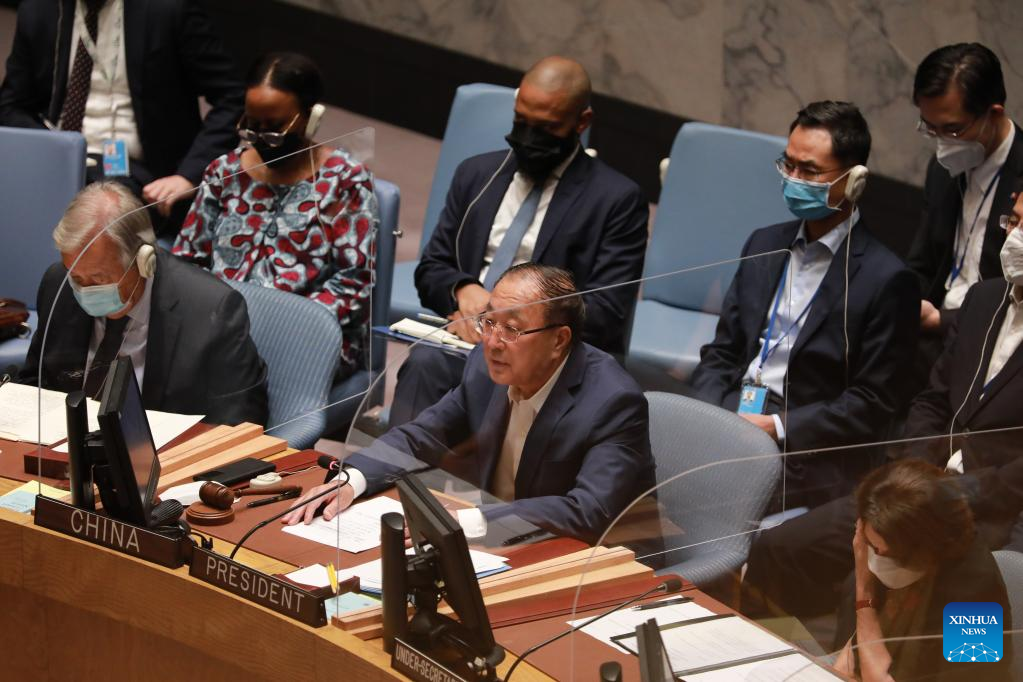
Wang Yi (C), a member of the Political Bureau of the CPC Central Committee and director of the Office of the Foreign Affairs Commission of the CPC Central Committee, meets with co-chairs of the Intergovernmental Negotiations on Security Council Reform of the 77th Session of the UN General Assembly, Tareq Albanai and Alexander Marschik, in Beijing, China, April 29, 2023. /Chinese Foreign Ministry
Wang Yi (C), a member of the Political Bureau of the CPC Central Committee and director of the Office of the Foreign Affairs Commission of the CPC Central Committee, meets with co-chairs of the Intergovernmental Negotiations on Security Council Reform of the 77th Session of the UN General Assembly, Tareq Albanai and Alexander Marschik, in Beijing, China, April 29, 2023. /Chinese Foreign Ministry
Editor's note: Stephen Ndegwa is the Executive Director of South-South Dialogues, a Nairobi-based communications development think tank. The article reflects the author's opinions and not necessarily those of CGTN.
The persistent social, economic and political divide between developed and developing countries has proved difficult to bridge. This is simply because the West has selfishly calibrated and distorted the international system, which by default has disadvantaged those with little economic power.
But that thinking is now drawing to a close, with growing demands that global leaders create an inclusive multilateral system. One of the most recent voices is that of Wang Yi, a member of the Political Bureau of the Communist Party of China (CPC) Central Committee and director of the Office of the Foreign Affairs Commission of the CPC Central Committee.
During a meeting with the co-chairs of the Intergovernmental Negotiations on Security Council Reform of the 77th Session of the UN General Assembly (UNGA) in Beijing on April 29, Wang reiterated that the reform of the United Nations Security Council should uphold fairness and justice and raise the representation and say of developing countries.
This is a call for a correction of historical injustices against Africa and empowerment for more small-and medium-sized countries to play a decisive role in the council.
The UNSC consists of five permanent members: China, France, the Russian Federation, the United Kingdom (UK) and the United States (U.S.) and ten non-permanent members who are elected by the General Assembly for two years. Although majority of the latter members include developing countries, they have little power when it comes to making decisions that impact world peace.
The mandate of the UNSC as set out in the UN Charter includes maintaining international peace and security, examining conflicts with global implications and recommending solutions, taking military action against an aggressor, and advocating economic sanctions instead of military action when appropriate.
However, the body has not been as effective as expected for its stature, a fact evident from unresolved hotspots in the world today which should have been resolved through negotiations and appropriate action. As Zhang Jun, China's permanent representative to the UN, said, "the only right way to ensure a fair reform is to increase the representation and say of developing countries, especially African countries, and to address the historical injustice suffered by African countries."

Zhang Jun (C, front), China's permanent representative to the United Nations, speaks during a UN Security Council meeting on the Ukraine conflict at the UN headquarters in New York, August 24, 2022. /Xinhua
Zhang Jun (C, front), China's permanent representative to the United Nations, speaks during a UN Security Council meeting on the Ukraine conflict at the UN headquarters in New York, August 24, 2022. /Xinhua
A contentious area currently in need of reform is the UNSC's veto power, which is reserved exclusively for permanent members. In the ongoing Russia-Ukraine crisis, for instance, it is foreseeable that a vote in favor of Russia could be rejected by Western members such as UK and the U.S. This is because the West is generally knee deep in the crisis by putting their weight behind Ukraine. They cannot be neutral arbiters.
The unilateral approach of the U.S. and its Western allies to global security is no longer sustainable or even feasible. Fair international rule of law is anachronistic with regards to the bloc's hegemonic ambitions because it requires dialogue and negotiation and a give-and-take outcome. The prevailing winner-takes-all scenario, however, takes the world back to the Cold War geopolitical tensions that shaped both unilateral and multilateral relations after World War II.
In the classical definition of the socio-economic scale, Russia and Ukraine are developing countries. With more representation from the Global South at the table of permanent members of the UNSC, the current conflict could possibly have been treated with more empathy, in contrast to the unilateralism and arbitrariness that the powerful Western countries took towards Russia.
The argument for greater involvement of developing countries in the reform not only of the UNSC but of the UN as a whole cannot be overemphasized. The Global South is often the first to bear the brunt of a global crisis, but the last to benefit from positive outcomes. Therefore, developing countries have a big stake in global developments and would be more sensible and objective in the decision-making process.
While global security essentially relates to nonviolence and peaceful coexistence between countries, it encompasses other areas of governance ranging from economic stability to environmental protection. Lack of food security and water shortages can also cause serious discoloration of our common security by setting off a perilous chain reaction. The UNSC must be all encompassing if it is going to continue being a relevant and powerful tool in creating a more peaceful world.
(If you want to contribute and have specific expertise, please contact us at opinions@cgtn.com. Follow @thouse_opinions on Twitter to discover the latest commentaries in the CGTN Opinion Section.)